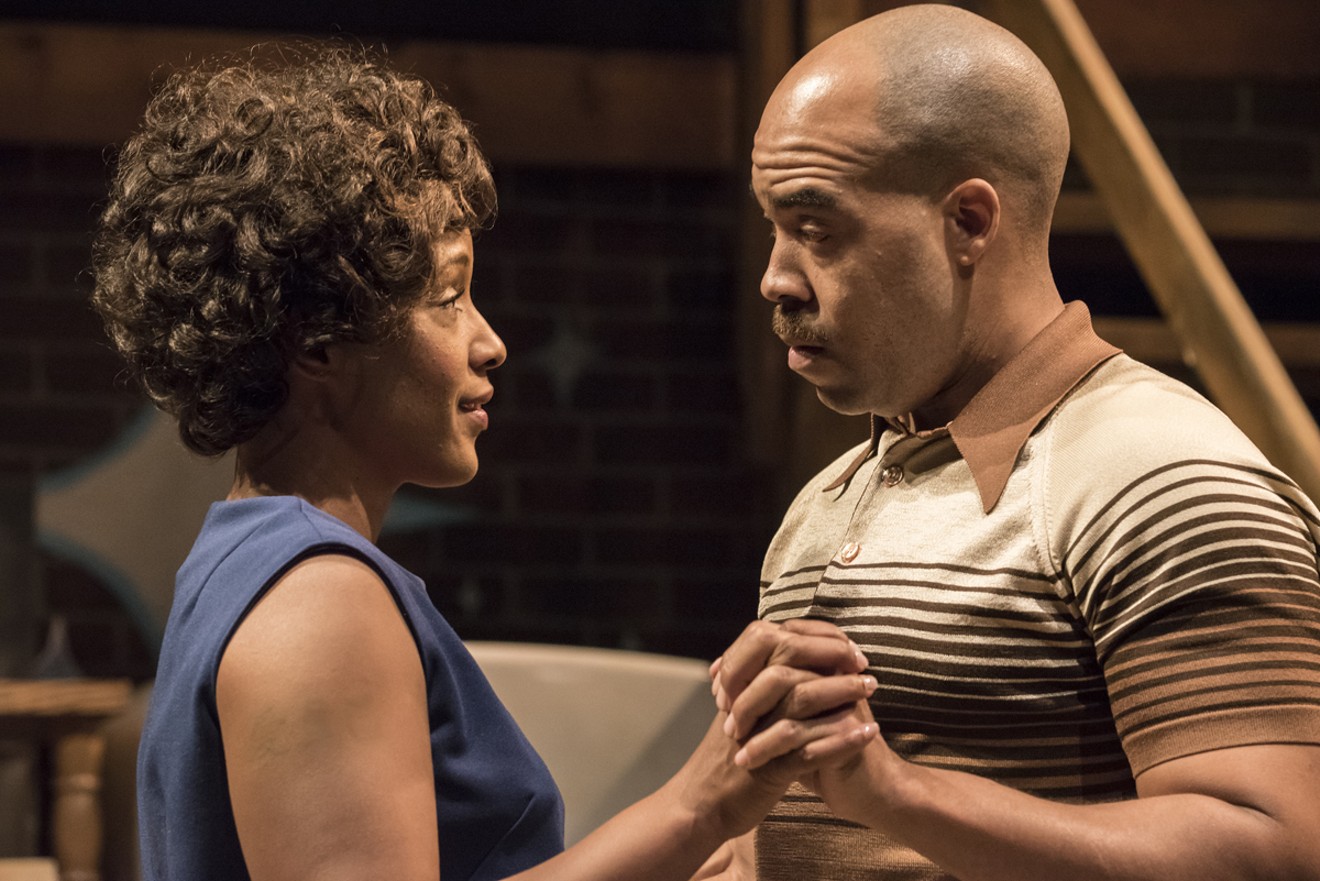The title alone should prepare you for sadness, fear and violence: Dominique Morisseau’s award-winning Detroit ’67, now in its regional premiere at Curious Theatre Company, is set during the uprising in that city 51 years ago that took the lives of 43 people, 33 of them black. But the play’s beginning is deceptively humorous and low-key. Having inherited their parents’ modest home and a small inheritance, Chelle and her younger brother, Lank, have created an after-hours club to bring in extra income. Longtime friends Sly and the irrepressible Bunny are interested and sometimes helpful observers, as brother and sister set the place up, swap their scratchy turntable for a new eight-track player to provide music — the Temptations, the Four Tops, Smokey Robinson and the Miracles — and organize a selection of snacks and drinks. But where Chelle craves comfort, stability, the well-being of her son who’s away at college and a safe life for Lank. His ambitions are more expansive. He frets at the limitations placed on black people in Detroit, and wants to go in with Sly on a bar of their own.
The tone and dynamic become more urgent when Lank and Sly return from an errand carrying a badly beaten and unconscious white woman, whom they place carefully on the sofa. They saw her staggering along the street, they explain to an astounded Chelle, and her eyes were pleading in a way Lank couldn’t ignore. Nor could they take her to a hospital: What would the staff make of two black men bringing in a half-comatose white woman? Chelle senses that this newcomer, Caroline, represents danger, and her instincts prove right.
In Detroit ’67, danger takes more than one form. There’s the rising tension in the streets outside the music-filled basement; there’s the clear attraction between Lank and Caroline, which also serves as a kind of metaphor for the former’s desire to cross lines and challenge boundaries; and there’s also the subtle threat that the white woman poses to Chelle’s sense of dignity and her own place in the world. It doesn’t help that Caroline is an oddly weaselly creature, silent about her predicament and releasing her story of corrupt connections only piece by reluctant piece. Anastasia Davidson plays the role as an odd mix of sincerity — Caroline clearly does care for Lank — and dishonesty.
Detroit ’67 is in large part a character study, with Chelle at its heart. She is given a quietly moving performance by Jada Suzanne Dixon, who makes her both sturdy and vulnerable, self-sacrificing and unable to consider her own happiness, but at the same time a bit of a smothering influence. Cajardo Lindsey is appealing and convincing as good-guy Lank; he and Dixon work perfectly together as brother and sister. Ilasiea Gray is sweetly bubbly as Bunny, and Frank Taylor Green exudes warmth as Sly.
Director Idris Goodwin, a poet and award-winning playwright who will direct This Is Modern Art — which he wrote with Kevin Coval — at the Denver Center for the Performing Arts Theatre Company in March, allows the political context its full due. Watching this story about a police force — and ultimately a federal government — at war with the country’s young black men, it’s impossible not to think about Trayvon Martin, gunned down by a man who thought himself a representative of the law as he walked home from a trip to buy candy; the violence in Ferguson, Missouri; Eric Garner’s desperate plea, “I can’t breathe,” and the recent tragic death of his daughter, Erica. Curious artistic director Chip Walton is dedicated to exploring issues of social justice, and although Detroit ’67 doesn’t carry the profound depth charge of the company’s last offering to deal with the country’s race history, Appropriate, the play’s affirmative final moment — beautifully rendered by Dixon — carries a power of its own.
Detroit ’67, presented by Curious Theatre Company through February 24, 1080 Acoma Street, 303-623-0524, curioustheatre.org.
[
{
"name": "Air - MediumRectangle - Inline Content - Mobile Display Size",
"component": "12017618",
"insertPoint": "2",
"requiredCountToDisplay": "2"
},{
"name": "Editor Picks",
"component": "17242653",
"insertPoint": "4",
"requiredCountToDisplay": "1"
},{
"name": "Inline Links",
"component": "18838239",
"insertPoint": "8th",
"startingPoint": 8,
"requiredCountToDisplay": "7",
"maxInsertions": 25
},{
"name": "Air - MediumRectangle - Combo - Inline Content",
"component": "17261320",
"insertPoint": "8th",
"startingPoint": 8,
"requiredCountToDisplay": "7",
"maxInsertions": 25
},{
"name": "Inline Links",
"component": "18838239",
"insertPoint": "8th",
"startingPoint": 12,
"requiredCountToDisplay": "11",
"maxInsertions": 25
},{
"name": "Air - Leaderboard Tower - Combo - Inline Content",
"component": "17261321",
"insertPoint": "8th",
"startingPoint": 12,
"requiredCountToDisplay": "11",
"maxInsertions": 25
}
]












